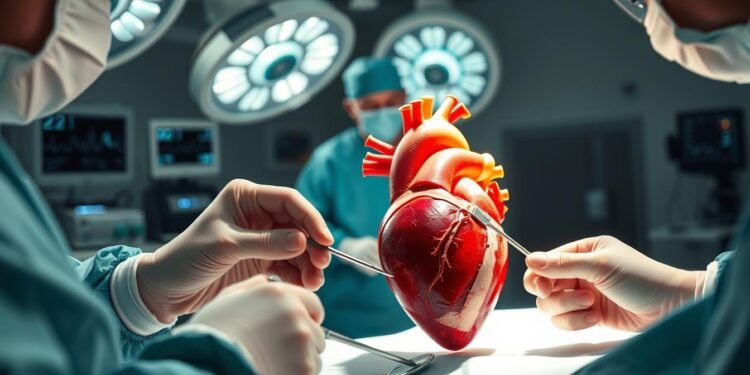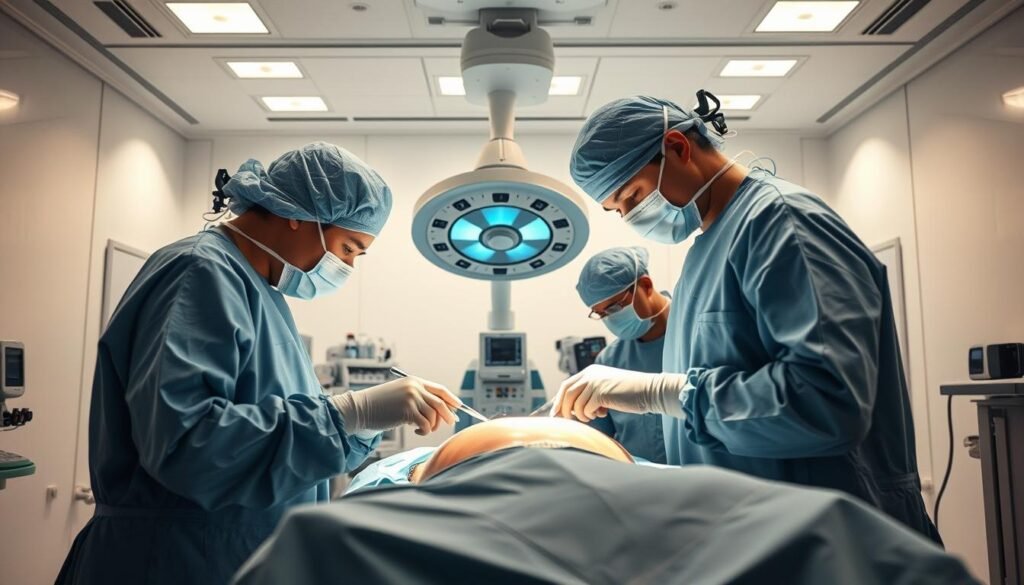What if a single surgeon could transform how we treat the most complex heart conditions? Sir Magdi Yacoub did exactly that through decades of groundbreaking work.
This Egyptian-British pioneer revolutionized cardiac surgery. He developed life-saving operations for congenital heart defects. His work gave hope to countless patients worldwide.
As Professor of Cardiothoracic Surgery at Imperial College London, he led innovative research. He established the world’s largest heart and lung transplantation program. His techniques became standard practice in operating rooms globally.
For over twenty years, he served as British Heart Foundation Professor. He focused on tissue engineering and myocardial regeneration. His legacy continues to inspire new generations of surgeons.
Key Takeaways
- Sir Magdi Yacoub transformed modern cardiac surgery through innovative techniques
- He developed groundbreaking operations for complex congenital heart conditions
- Established the world’s largest heart and lung transplantation program
- Served as Professor of Cardiothoracic Surgery at Imperial College London for decades
- His research continues to influence tissue engineering and heart regeneration
- Pioneered the arterial switch operation for transposition of great arteries
- His work has saved countless lives and set new standards in heart surgery
Early Life and Surgical Training
Every great medical pioneer has a beginning. The journey starts long before the first surgery.
Magdi Yacoub’s story began in 1935 in Bilbeis, Egypt. He grew up in a Coptic Christian family. His father worked as a surgeon in public health.
This early exposure to medicine shaped his future. A personal tragedy also influenced his path. His aunt died from mitral valve disease.
This loss showed him how heart conditions affect families. It inspired his lifelong commitment to helping patients.
Childhood in Egypt and Medical Education
Young Magdi showed exceptional academic talent. He earned a scholarship to medical school at just 15.
He entered the University of Cairo College of Medicine. This was an extraordinary achievement for someone so young.
He graduated with his medical degree in 1957. He then completed two years of surgical residency. This training gave him strong foundational skills.
Move to the United Kingdom and Early Fellowships
In the early 1960s, Yacoub sought advanced training. He moved to Britain for a fellowship opportunity.
He worked under Sir Russell Brock at Guy’s Hospital. This experience exposed him to cutting-edge techniques.
His time in the United Kingdom broadened his perspective. He learned from top surgeons in London.
Transition to the United States and Academic Roles
In 1968, Yacoub continued his journey westward. He moved to the United States for new opportunities.
He joined the University of Chicago as an Instructor. He was soon promoted to Assistant Professor.
These academic roles helped shape his surgical philosophy. He developed his unique approach during this period.
His multicultural background gave him a global outlook. This perspective would later influence his work with children and adults worldwide.
These formative years built the foundation for his future achievements. They prepared him for his groundbreaking work in cardiothoracic surgery.
Pioneering Surgical Techniques and Transplant Innovations by Magdi Yacoub
Innovation in medicine often comes from challenging established norms. This surgeon’s work transformed how we approach complex heart conditions.
His collaborations led to breakthroughs that saved countless lives. The techniques developed became standard practice worldwide.
Ross Procedure and Valve Repair Advancements
In the 1960s, a significant partnership began with Donald Ross. They worked on repairing damaged heart valves.
Their successful cases were reported in the British Medical Journal. This work laid the foundation for future innovations.
The Ross procedure became particularly valuable for young patients. It involved replacing the aortic valve with the patient’s own pulmonary valve.
This approach avoided the need for lifelong anticoagulation therapy. The modified Ross-Yacoub technique improved outcomes for growing children.
Arterial Switch Operation for Congenital Heart Defects
In 1977, a groundbreaking solution emerged for transposition of great arteries. This congenital condition required innovative thinking.
The two-stage arterial switch operation revolutionized treatment. It gave hope to infants born with this complex defect.
This procedure demonstrated how creative approaches could solve seemingly impossible problems. It became a standard treatment worldwide.
Establishing the Harefield Hospital Transplant Program
The year 1980 marked a new chapter in transplant medicine. Harefield Hospital became home to a groundbreaking program.
Europe’s first long-surviving heart transplant was performed here. Derrick Morris received this life-saving operation.
His successful recovery proved that heart transplantation could offer long-term survival. This achievement inspired confidence in the medical community.
UK’s First Combined Heart and Lung Transplant
Another historic moment came in 1983. The United Kingdom saw its first combined heart and lung transplant.
This complex procedure represented a major advancement in transplant surgery. It opened new possibilities for patients with end-stage lung disease.
John McCafferty’s case became particularly remarkable. He survived over 33 years after his transplant, setting a world record.
These achievements demonstrated the potential for long-term success in transplantation. They gave hope to countless patients facing critical conditions.
The work at Harefield Hospital transformed cardiac care standards. It showed that even the most complex cases could have successful outcomes.
Later Career, Philanthropy, and Global Impact
True legacy extends far beyond retirement. It continues through teaching, giving back, and pushing boundaries.
Sir Magdi Yacoub’s later years show this perfectly. His work expanded to help people everywhere.
He focused on making heart care available to all. This mission took him across the globe.
Founding Chain of Hope for Pediatric Cardiac Care
In 1995, he started Chain of Hope. This charity helps children in poor countries.
It brings life-saving surgery to kids who need it. Teams travel to places with little medical care.
They perform complex operations on young hearts. This work saves thousands of lives each year.
Even after retiring from the NHS in 2001, he kept helping children. His dedication never faded.
Magdi Yacoub Heart Foundation and Aswan Heart Project
In 2008, he co-founded the Magdi Yacoub Heart Foundation. This group does important work in Egypt.
They started the Aswan Heart Project. It offers free medical services to those in need.
The heart center there serves many patients. It combines treatment with teaching and research.
This project shows his commitment to his homeland. It brings world-class care to remote areas.
Research in Tissue Engineering and Recent Innovations
His research team made big strides in tissue engineering. In 2007, they grew human heart valves from stem cells.
This was a major breakthrough in medical science. It opened new paths for treating heart failure.
In 2025, he revealed a revolutionary “living valve.” This valve can integrate with the patient’s body.
It represents the future of cardiac surgery. Such innovations continue to push medicine forward.
Honors, Awards, and International Recognition
Sir Magdi received many honors for his work. He was knighted in 1992 for his services to medicine.
He earned the Order of Merit in 2014. Egypt gave him the Order of the Nile in 2011.
Professional groups also celebrated his achievements. He won the Lister Medal in 2015.
The Royal Society made him a Fellow in 1998. He received the Texas Heart Institute Ray C. Fish Award that same year.
In 2004, he got a Lifetime Achievement Award from heart transplant experts. The European Society of Cardiology gave him a gold medal in 2006.
These awards highlight his global impact. They honor a lifetime of saving lives and advancing science.
Conclusion
Sir Magdi Yacoub’s legacy reshaped modern cardiac care. His pioneering work in heart surgery and transplantation saved countless lives worldwide.
He combined surgical excellence with groundbreaking research. His innovations in heart valve procedures and tissue engineering continue to influence medical practice.
The professor mentored generations of surgeons while maintaining global humanitarian efforts. His foundation provides critical care to underserved communities.
With over 1,400 publications, his work remains essential reading. Sir Magdi Yacoub’s model of combining clinical skill with scientific curiosity continues to inspire.
FAQ
What is Professor Sir Magdi Yacoub best known for?
He is renowned as a pioneering cardiac surgeon, famous for his groundbreaking work in heart and lung transplantation. He performed the UK’s first combined heart and lung transplant and developed the Harefield Hospital transplant program into a world-leading center.
What are some of his most significant surgical innovations?
His key innovations include the arterial switch operation for babies born with a severe congenital heart defect and advancements in heart valve repair techniques, notably the Ross Procedure, where a patient’s own pulmonary valve replaces a damaged aortic one.
How has he contributed to global healthcare beyond surgery?
Through the charity Chain of Hope, he provides life-saving cardiac surgery for children in developing countries. His Aswan Heart Centre in Egypt serves as a center of excellence for treatment, research, and training, extending his impact across the Middle East and Africa.
What major honors has he received for his work?
His contributions have been recognized with some of the highest honors, including a knighthood from Queen Elizabeth II, the Order of Merit, and the prestigious Lister Medal for his surgical achievements.
What is the focus of his current research?
His research now focuses on the future of cardiac care, pioneering tissue engineering to grow living heart valves. This revolutionary work aims to eliminate the need for mechanical valves or lifelong medication in patients.







